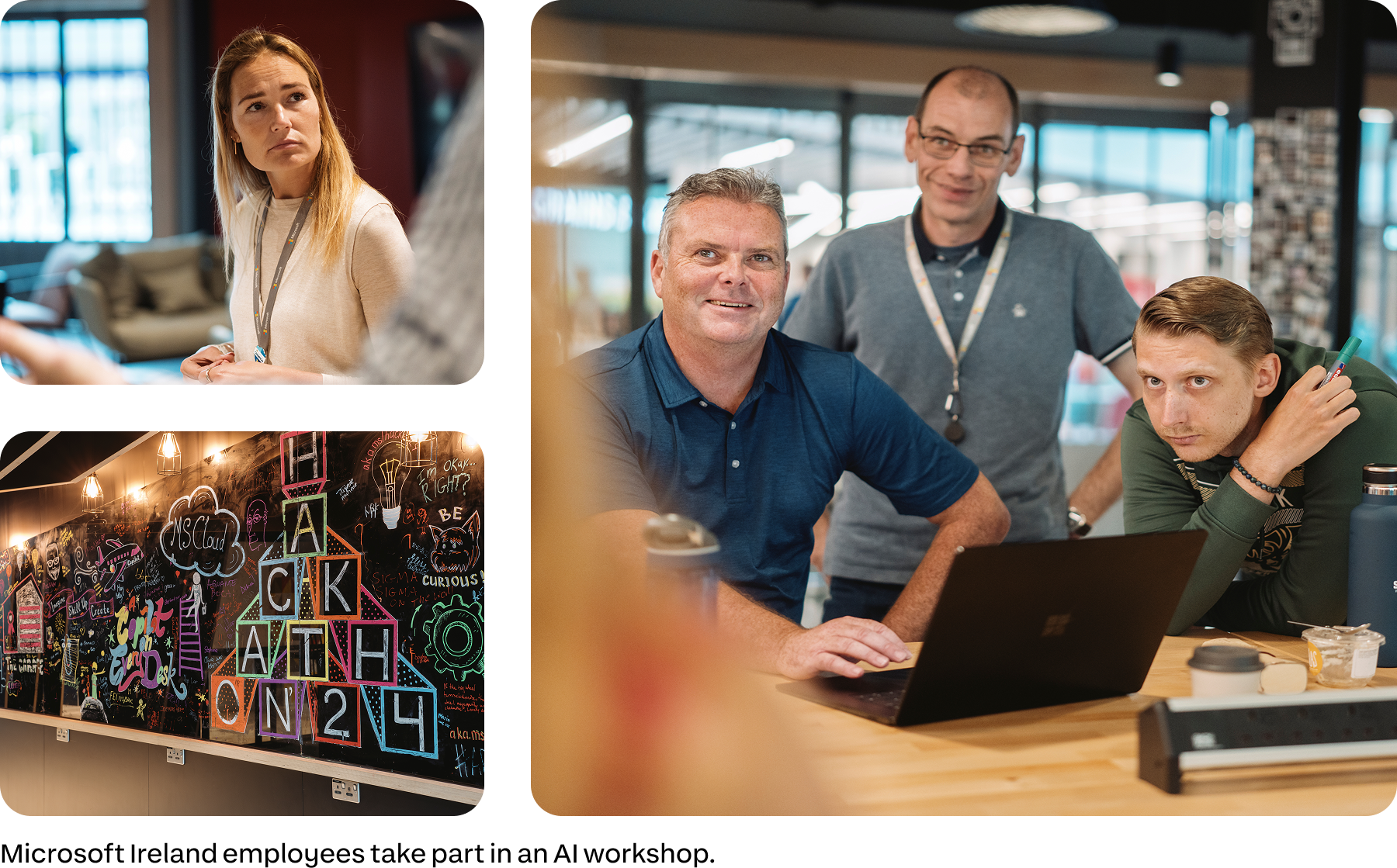Engineering the Future
Takeaways
Ireland is playing a key role in the global AI value chain by converting advanced AI research into enterprise-ready solutions. The government’s “Silicon Island” strategy anticipates semiconductor industry employment will grow from 20,000 to 34,500 by 2040, highlighting AI hardware as a national priority.
Government policies, including Ireland's AI strategy, support responsible AI development across research, commercialization and regulation. This approach is reinforced by a strong talent pipeline, attracting major multinationals like Intel, AMD and Qualcomm.
Microsoft Ireland exemplifies the country’s AI momentum, with over 4,000 employee roles in global R&D and AI development. AI adoption in Irish businesses is on the rise, showcasing rapid integration and positioning Ireland as a leader in scalable, ethical AI solutions.
Summary by Bloomberg AI
A realization came to Professor Peter O’Brien as he worked on robotic space exploration projects at NASA’s Jet Propulsion Lab in California. It struck him that the niche technology that had always excited him was valuable only once it was applied in practice.
“People need systems. If you’re building a spacecraft, you have to deliver a module—they want the whole thing,” he says. “I like research, but I also like the fact that it can be applied; it has to go somewhere.”
O’Brien brought this philosophy back to his native Ireland, where he leads a team of researchers at Tyndall National Institute in Cork. Among his clients are companies seeking hardware solutions to meet the surging demands of AI computing, as the growing volume of data processing is pushing the limits of traditional semiconductor technology.
Photonics packaging is driving the next generation of semiconductor systems, offering the potential for high-performance data processing in ever-smaller and more efficient forms. O’Brien’s team produces advanced photonic and microelectronic prototypes and manufacturing pathways for diverse applications in communications, health care, remote sensing, computing and AI.
While much of his lab’s work starts with pure research, O’Brien emphasizes to his academic team the ultimate aim of taking the work to a higher “technology-readiness level.”
“Users don’t care about your technology. They don’t buy it because it’s cool; they buy it because it solves a problem,” he says. “It’s a great opportunity for Ireland to look at how we commercialize that technology, going to full-scale manufacturing.”


AI innovation is increasingly enabling businesses to successfully navigate the chasm between the vast theoretical potential of AI and its everyday operation.
According to Gartner research, 84% of CIOs plan to increase their AI spend over the next year. Yet many business leaders still want to see more persuasive business use cases.
Across Ireland, the use-case gap is being bridged. The US and China may be leading foundational AI research, but Irish operations such as Tyndall—with its cohort of AI-savvy microelectronics PhDs—are turning promising AI concepts into enterprise-ready solutions at a rapid rate.
In May, Tyndall was the venue for the launch of Ireland’s National Semiconductor Strategy, dubbed “Silicon Island.” Some 20,000 people already work in this field in Ireland, and the government foresees up to 34,500 additional roles by 2040.
“Semiconductors are the connective tissue of the AI industry and landscape,” says Anne-Marie Tierney-Le Roux, Senior Vice President of Enterprise Technology at IDA. “Given our existing footprint, Ireland is well positioned to capitalize on that.”
She points to the arrival in Ireland of Analog Devices, a leading global semiconductor manufacturer, in 1976. “It might seem that we have been an overnight success in AI hardware, but actually, our capability in this area has been building over 50 years,” she says.


This strategic positioning is being deliberately strengthened through coordinated government policy. IDA Ireland’s Adapt Intelligently strategy identifies AI and semiconductors as two of its key strategic growth drivers, recognizing their fundamental role in Ireland’s economic future.
The Department of Enterprise, Tourism and Employment (DETE), IDA Ireland’s parent department, has reinforced this commitment through its National AI Strategy Refresh 2024, which builds on Ireland’s AI—Here for Good framework. As a member of the AI Advisory Council, DETE is actively shaping policy to ensure that Ireland remains at the forefront of responsible AI development and deployment.
This multilayered approach—spanning fundamental research, commercial application and regulatory oversight—creates a comprehensive ecosystem that supports AI innovation at every stage of the value chain.


Today, three of the world’s top four AI chip companies have a large Irish presence. Intel has invested over €30 billion in its site in the Kildare town of Leixlip, where leading-edge processors are made. AMD, which entered the country through an acquisition, has one of its largest European R&D sites in Dublin. And Cork is a core IT and engineering hub for Qualcomm.
Complementing them are a host of software developers for whom building systems at scale is second nature, with global hyperscalers working alongside enterprise SaaS companies.
Another huge advantage is Ireland’s large pool of skilled talent. The country boasts the highest educational attainment rate in the world, with 52.4% of residents holding a degree—far outstripping second-place Switzerland, with 46%.
For many employers, the tech skills of the workforce stand out. “Ireland has the highest number of STEM graduates per capita in the EU at the moment, so the pipeline from an engineering and tech point of view is exceptionally strong,” says Catherine Doyle, General Manager of Microsoft Ireland.
Microsoft first arrived in Ireland in 1985, setting up a small manufacturing operation in Dublin. Today, the company’s Irish business employs more than 4,000 people and is a strategic R&D hub at the center of Microsoft’s AI development.

“In Ireland, we’re home to a broad range of the engineering functions, including teams leading innovation in cloud infrastructure, cybersecurity and AI-powered business applications like Microsoft 365 Copilot and Dynamics 365,” says Doyle.
Irish teams comprise a big part of the company’s Secure Future Initiative, which ensures that security standards are built into every new tech solution—an especially critical component to build trust in the field of AI.
The initiative echoes Ireland’s National AI Strategy, Here for Good, which sets out an ethical, people-centered approach to AI leadership. Ireland’s vigilance regarding AI risks—alongside its many benefits—is led by the proactive oversight and regulatory work of the Irish Data Protection Commission, which monitors emerging AI technologies and ensures compliance with data privacy standards.


Doyle believes that AI is increasingly recognized as “a general-purpose technology, similar to electricity and the internet.” The company’s recent research with Trinity College Dublin confirms this: 91% of Irish organizations now use AI in some form—nearly double the percentage a year ago.
Microsoft is dedicated to equipping businesses with the tools, skills and strategies necessary to excel in an AI-driven economy. The company’s Skill Up Ireland education and skills program provides courses and initiatives to help people of all backgrounds, ages and experience levels upskill for an AI future.
“With targeted investments in AI education, scalable technologies and strategic collaborations, we can ensure that the benefits of AI reach every corner of the economy, positioning Ireland as a global leader in AI innovation,” says Doyle.
